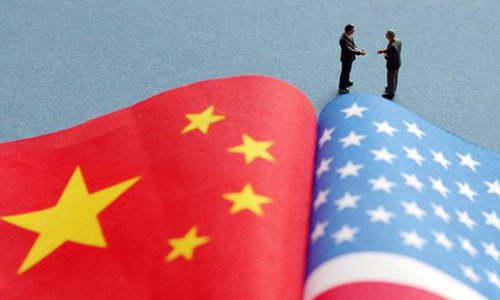HOME >> SOURCE
Mainland markets fluctuate mildly after initial trade war deal
Source:Global Times Published: 2019/12/16 12:00:01
Trade deal to push benchmark Shanghai stock market to above 3000 points in 2019, expert says

Chinese and US trade officials make attempt at striking a trade deal to defuse an increasingly bruising trade war that has rattled global markets and presented mounting challenges to both economies. Photo: VCG
News of China and the US initializing a major thaw in their trade dispute would stabilize the A-share market and push it to break the 3,000-point level by the end of this year, experts said on Monday.On Monday morning, the two mainland stock markets responded differently to the trade war progress. By 11:30 am, the Shanghai Composite Index edged down by 0.22 percent to 2,961 points, while the Shenzhen Composite Index rose by 0.41 percent to 10,045.8 points.
A total of 42 stocks rose to their daily trading limit of 10 percent on Monday morning.
China and the US on Friday night (Beijing time) agreed on the terms of a phase one trade deal that reduces some US tariffs on Chinese goods while boosting Chinese purchases of certain US products.
On Saturday, China also announced that it would suspend additional tariffs on US products that had been due to kick in on Sunday.
"The substantial progress in the China-US trade negotiations would largely alleviate worries of the global capital markets," Yang Delong, chief economist at Shenzhen-based First Seafront Fund Management, predicting that the A-share market can break the 3,000-point level by the end of this year.
Xi Junyang, a professor at the Shanghai University of Finance and Economics, said that A-share markets fluctuated to a limited extent on Monday as the market absorbed the trade war news beforehand on Friday, when some overseas media already disclosed reaching of the phase one deal.
"But at least the markets share the understanding that the China-US trade war isn't likely to deteriorate. This would stabilize the A-share market and prevent it from a sliding trend," he said.
The Shanghai market edged up by 1.78 percent on Friday, while the Shenzhen market edged up by 1.71 percent. The Nasdaq Composite Index rose by 0.2 percent that same day.
The China-US trade friction, which has lasted nearly two years, has struck a blow to the global capital markets. It has added pressure on the A-share market though the latter has gradually grown less sensitive to the trade war fluctuations as the negotiations proceed amid twists and turns.
Xi also said that investors don't have a strong willingness to buy in shares as uncertainties haunt the economic growth in China next year.
Global Times
Posted in: MARKETS,BIZ FOCUS